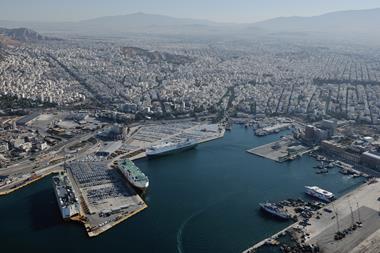A group of carmakers in Russia has asked the government to pay the outbound logistics subsidies it promised for finished vehicles and automotive components delivered to foreign markets in 2018.
GAZ Group, Kamaz, Avtovaz, Sollers and Renault have filed a letter with the Russian Prime Minister Dmitry Medvedev and deputy Prime Minister Dmitry Kozak, insisting that the actual figure of outbound logics subsidies paid last year appeared to be lower than the federal authorities originally agreed.
In 2018, the Russian federal budget allocated 14 billion rubles ($217m) under the inter-branch programme of non-resource exports support. Most of this money has been shared by the timber, chemical and metallurgical industries, with subsidies to the automotive industry reaching only 2 billion rubles – not enough to reimburse logistics costs as promised.
The Russian government had said it would reimburse 300,000 rubles for sea transport of a 40-foot container with automotive products, and pay 100 rubles per kilometre covered by automotive carriers. In all cases, the government promised to reimburse up to 20% of logistics costs associated with component and finished vehicle delivery to foreign markets.
Since 2017, the government has covered outbound logistics costs for the transport of automotive products not only within Russia, but outside it.
Lack of support could cost exports
Giving the growth in automotive exports from Russia last year, the government was supposed to pay 4 billion rubles in logistics subsidies to its carmakers. However, the final figure was 2 billion rubles ($230 million) because the federal budget was short of money.
Avtovaz received 800m rubles less in subsidies in 2018 than the company had expected, a source in the company told local newspaper Vedomosti. In total, the company exported 41,470 finished vehicles and automotive kits in 2018, 68% more than during the previous year.
The lack of subsidies meant that operations delivering finished vehicles to the Middle East, Latin America and Africa appeared to be loss-making, the source said. The overall logistics costs can be as much as 15% of total production costs, he added.
If the government will not meet its obligations and pay the promised export subsidies in full, the only solution would be to withdraw from exporting finished vehicles to remote markets, where Avtovaz has only just started gaining a foothold, the source added.
As for 2019, the logistics subsides promised by the government to the automotive industry would be enough only to cover costs until the end of the first quarter of the year, the source admitted. So far, there is no information on whether the government plans to increase that figure.
Dmitry Kozak’s administrative office responded to the letter from the carmakers by saying that the government was under no obligation to meet the requirements of all applications submitted for the logistics subsidies in full, and that from the very beginning there was an upper threshold of costs the government could afford under this programme.

























![Global[1]](https://d3n5uof8vony13.cloudfront.net/Pictures/web/a/d/s/global1_726550.svgz)











